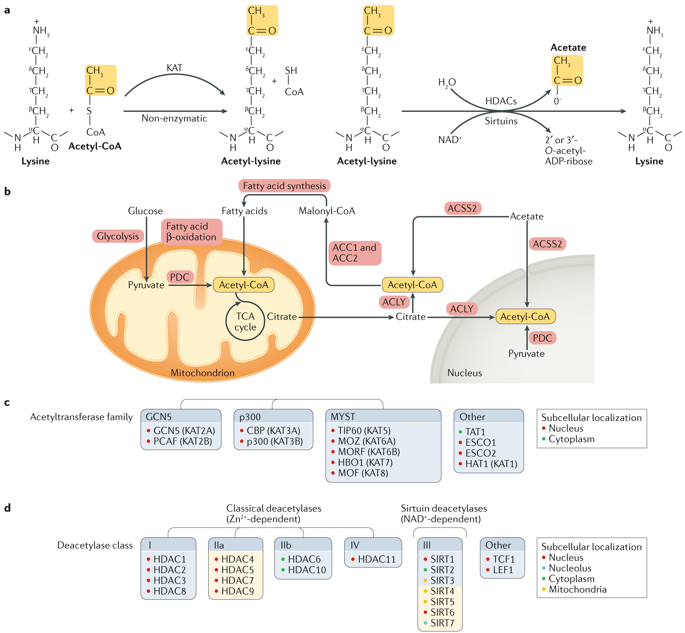当前位置:
X-MOL 学术
›
Nat. Rev. Mol. Cell Biol.
›
论文详情
Our official English website, www.x-mol.net, welcomes your
feedback! (Note: you will need to create a separate account there.)
Functions and mechanisms of non-histone protein acetylation.
Nature Reviews Molecular Cell Biology ( IF 81.3 ) Pub Date : 2019-03-01 , DOI: 10.1038/s41580-018-0081-3 Takeo Narita 1 , Brian T Weinert 1 , Chunaram Choudhary 1
Nature Reviews Molecular Cell Biology ( IF 81.3 ) Pub Date : 2019-03-01 , DOI: 10.1038/s41580-018-0081-3 Takeo Narita 1 , Brian T Weinert 1 , Chunaram Choudhary 1
Affiliation

|
Nε-lysine acetylation was discovered more than half a century ago as a post-translational modification of histones and has been extensively studied in the context of transcription regulation. In the past decade, proteomic analyses have revealed that non-histone proteins are frequently acetylated and constitute a major portion of the acetylome in mammalian cells. Indeed, non-histone protein acetylation is involved in key cellular processes relevant to physiology and disease, such as gene transcription, DNA damage repair, cell division, signal transduction, protein folding, autophagy and metabolism. Acetylation affects protein functions through diverse mechanisms, including by regulating protein stability, enzymatic activity, subcellular localization and crosstalk with other post-translational modifications and by controlling protein-protein and protein-DNA interactions. In this Review, we discuss recent progress in our understanding of the scope, functional diversity and mechanisms of non-histone protein acetylation.
中文翻译:

非组蛋白乙酰化的功能和机理。
Nε-赖氨酸乙酰化是半个多世纪前发现的,作为组蛋白的翻译后修饰,在转录调控的背景下已被广泛研究。在过去的十年中,蛋白质组学分析表明,非组蛋白经常被乙酰化,并在哺乳动物细胞中占乙酰化组蛋白的主要部分。实际上,非组蛋白的蛋白质乙酰化涉及与生理和疾病有关的关键细胞过程,例如基因转录,DNA损伤修复,细胞分裂,信号转导,蛋白质折叠,自噬和代谢。乙酰化通过多种机制影响蛋白质功能,包括调节蛋白质稳定性,酶促活性,亚细胞定位和与其他翻译后修饰的串扰,并通过控制蛋白质-蛋白质和蛋白质-DNA相互作用来实现。在这篇综述中,我们讨论了我们对非组蛋白乙酰化的范围,功能多样性和机理的最新进展。
更新日期:2019-01-26
中文翻译:

非组蛋白乙酰化的功能和机理。
Nε-赖氨酸乙酰化是半个多世纪前发现的,作为组蛋白的翻译后修饰,在转录调控的背景下已被广泛研究。在过去的十年中,蛋白质组学分析表明,非组蛋白经常被乙酰化,并在哺乳动物细胞中占乙酰化组蛋白的主要部分。实际上,非组蛋白的蛋白质乙酰化涉及与生理和疾病有关的关键细胞过程,例如基因转录,DNA损伤修复,细胞分裂,信号转导,蛋白质折叠,自噬和代谢。乙酰化通过多种机制影响蛋白质功能,包括调节蛋白质稳定性,酶促活性,亚细胞定位和与其他翻译后修饰的串扰,并通过控制蛋白质-蛋白质和蛋白质-DNA相互作用来实现。在这篇综述中,我们讨论了我们对非组蛋白乙酰化的范围,功能多样性和机理的最新进展。






























 京公网安备 11010802027423号
京公网安备 11010802027423号